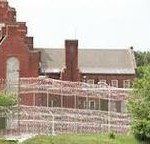The nursery at Bedford Hills Correctional Facility for Women in Westchester, NY allows inmates to keep their newborns with them behind bars for up to 18 months. The nursery has also served as a model for programs in 10 other states.
One study showed that 33% of moms who’d been separated from their babies wound up back in prison, compared to the fewer than 10% of them who were able to keep their babies and didn’t return to prison. The cost for each baby is roughly $24,000 per year, but that’s cheaper than the $30,000 per year that it costs if a mom, who didn’t receive any support, ends up back in jail–plus the high costs of foster care.
In the late 1990s, an average of nearly 100 inmates participated in the state nursery program at Bedford Hills annually and at the now defunct nursery at neighboring Taconic Correctional Facility. By 2014, that figure dropped to 22.
Department of Corrections and Community Supervision (DOCCS) officials have still not provided responses to basic questions such as how many inmates were accepted or denied admission into the state’s nursery program, or how many inmates were removed from the program for punitive reasons. Some records refer to inmates being discharged from the nursery for “disciplinary sanctions,” but none offered a running tally of how many times this occurred or what kinds of infractions were committed.
One June 2014 report states that three inmates were removed from the Bedford Hills nursery for unspecified disciplinary reasons and makes no note of what ultimately happened to their infants. The same report states that the nursery, which is equipped for 27 mother-baby pairs, had only 11 participants at the end of that quarter.
The department has still not provided a comprehensive figure for how many inmates appealed their denials and how many of those appeals were ultimately successful, or how long the agency took to process applications. Both of those issues arose in lawsuits filed in court to contest inmates’ rejections to participate in the nursery program.
While Taylor Vogt, a DOCCS spokeswoman, did not provide comment specifically on the nursery’s population decline or the nature of denials, she wrote, “the number of admissions is reflective of the number of women who are pregnant at the facility” and that “guidelines dictate who is admitted.”
State law mandates women accepted into the program only be physically fit and that participation be in the best interests of the child, but correction officials have typically exercised more discretion based on subjective factors.
A page from a prison manual outlines additional criteria such as an inmate’s past parenting history, “the number of opportunities she has had to better her situation, and her expressed attitudes toward her unborn child.”
A long sentence and any disciplinary sanctions while incarcerated can also lead to denials and the manual notes that officials will place “great scrutiny” on “arson, assault and child abuse” as well as “prior incarceration with poor adjustment.”
Records show the agency granted physical access to the nursery to six different media outlets in 2013 alone, resulting largely in positive stories. Among them was ABC’s “Nightline,” which featured interviews with nursery mothers inside the facility.
The vast majority of the 2000 or so inmates who give birth in American prisons are separated from their babies shortly after birth. Bedford is one of the handful of women’s prisons that allow some incarcerated moms to keep their newborns with them, in some cases until the babies are a year and a half old.
Inmate Jacqueline McDougall, 26, told “Nightline”:
I think seeing my son Max’s little face every day and knowing that I have to take care of him is definitely going to be a big incentive for me. I’ve had time to clean up my act and really see where I was headed. It wasn’t in a good direction. At the end of it all now, I kind of think this saved my life.
No one convicted of violent crimes, arson or crimes involving children are allowed into Bedford’s program. McDougall landed herself in prison after she got caught stealing silverware. She said she needed the money to buy drugs, including prescription pills and cocaine. By the time she was sent to prison, McDougall said she was clean, but also pregnant.
Dr. Janet Stockheim, a pediatrician who comes every two weeks to check up on the babies in the prison said it can benefit a baby to be raised behind bars:
The babies aren’t aware. They get excellent care. They are very well-bonded to the mother. Bonding gives a baby trust in the world that they will be taken care of. The babies do better here than they would on the outside with some of these mothers.
Max and his mother have never spent a full day apart. Aside from her chores in the prison block, McDougall is a full-time single parent, bathing, diapering, and nursing, which heightens bonding for both mother and baby. The mothers also get parenting classes.










